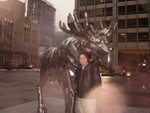What can be said about today's saint? He is a man that seems truly larger than life. His importance cannot be under-estimated. It was to his tomb that Benedict XVI made one of his first pilgrimages after ascending to the throne of Peter. It was five general audiences that the same Pope catechized about St. Augustine(1, 2, 3, 4, and 5). John Paul II devoted a whole Apostolic letter to him: AUGUSTINUM HIPPONSENSEM.
His influence on theology cannot be underestimated -- I know this especially now, as there is hardly a course that I attend that does not go back to Saint Augustine at some point.
He not only left us with theology, but his very own reflections on his spiritual journey in the Confessions. Here his theology meets his personal experience.
In his Confessions, we can see that St. Augustine in his time (the decline of the Roman empire) and his place (northern Africa) faced many challenges that are analogous to what we as Christian of the third millenium face. As a culture we look make many of the conversions that he made on his journey to Christ.
It would me impossible to summarize even a list of the themes that are covered in this great doctor's works, so the following thoughts are necessarily incomplete:
- The Saint took the words of Christ seriously - I am the way, the truth and the light - for this reason for the saint there could be no disagreement between what he knew from revelation (scripture and tradition) and what he knew from reason (Greek philosophy). For us today this means that there can be no conflict between what is taught in matters of faith and morals and what we learn from science. At a specific level - the fact that science does not consult with moral philosophers, means that science is in moral error. An example: If you find any biology or an anatomy book from before 1973 (the year of Roe vs. Wade) it will clearly teach that human life begins at conception, it is only after the moral error of Roe vs. Wade that the truth about human life becomes confused among the scientist.
- There is beauty in being a Christian. So often beauty and truth come together. A reflection from G.K. Chesterton: After I had told others that I was becoming Christian they would say, "you poor thing, having to stoop low to enter those old ugly churches," but never did I ever enter something so beautiful as a Catholic church. The beauty of Catholicism is so often lost today, but interiorly it is still there. There is a beauty in Catholicism, because there is nothing more beautiful than love, and Catholics more than anyone believe in the greatest love that there is - the love of the Father, the Lover; for the Son, the Beloved; and this Love itself is the Holy Spirit. As Catholics we trust, without fail, that salvation means being incorportated into this eternal exchange of divine love. What could be more beautiful than that?
- Lastly would be Augustines view on history, which to be honest I am not well versed on, but it has important political repercussions for today: History begins and ends with God. It flows from God, and will return to him. Even political system that claims to end the drama of history, will always fall short. Many will promise you everything, but only the One, that is God, can fulfill that promise, as Christ says: Come to me all you who are thirsty, and never be thirsty again.




No comments:
Post a Comment